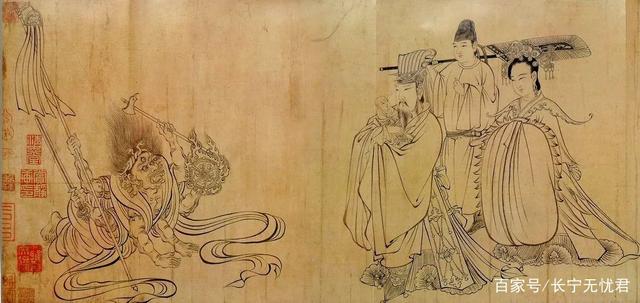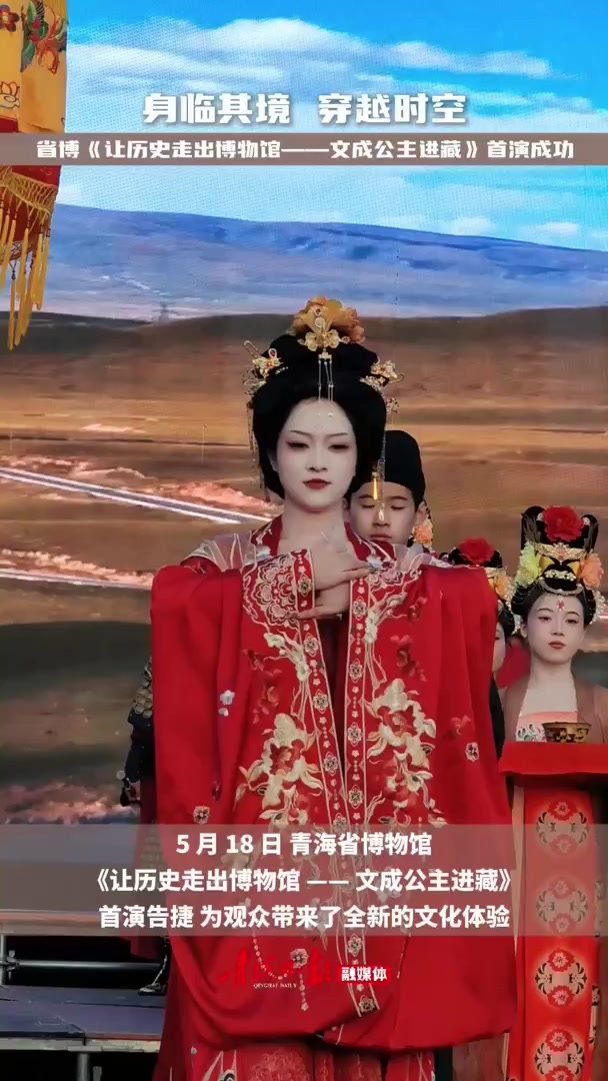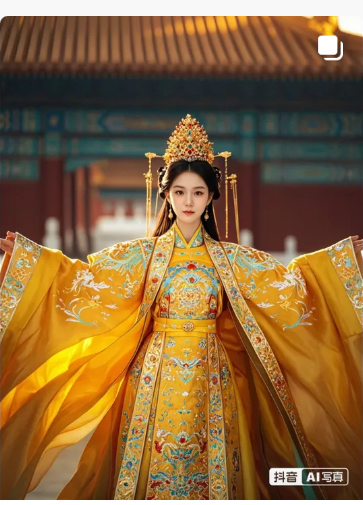When it comes to Wei Yingwu, what does everyone think of? Below, the History Encyclopedia editor will introduce relevant historical events to you.
Wei Yingwu, a poet of the mid Tang Dynasty, was definitely an unconventional figure in that era of brilliant stars in the poetry world.
Wei Yingwu is good at depicting scenery, and his poetry is known for its reclusive style of “serene and lofty, with light clouds and gentle winds”. However, many people may not imagine that a great poet who could write such elegant and refined prose was actually a uneducated and incompetent young man who used his power to bully others and run rampant in his early years!
It is said that a prodigal son will not exchange for gold when he returns, and Wei Yingwu is a typical example of this. In addition, another well-known figure is Chen Ziang. However, Chen Ziang was only a “martial arts fan” when he was young, and at least he had a good reputation outside. He was referred to as a “young hero” in his hometown. And this Wei Yingwu was notorious in his youth because he came from a prestigious family and was naturally arrogant. In his teens, he relied on his identity as a “royal guard” to be arrogant and unrestrained, bullying the countryside and even harboring criminals. The people dared not speak of his suffering.
Such people will inevitably go through some hardships before they understand the true meaning of life. Wei Yingwu was just like that. The turbulence of mountains and rivers, the collapse of the country, and the difficulties of the family gave him a crucial growth. It was this time that Wei Yingwu completed the most perfect transformation, from a local ruffian to a poetry tycoon, which can be called a magnificent reversal and a comeback in life!
01 /
Rich families and villains run rampant in the countryside
Located in the south of the city, Wei Du was five feet away from heaven. Like Du Mu, Wei Yingwu was born into a highly prestigious family in the imperial capital. His ancestors had many noble officials, and his great grandfather Wei Daijia had served as the prime minister of the Wu Zetian dynasty. His father was also highly respected at that time. Naturally, Wei Yingwu could be said to have been born with a golden key.
Young Master Wei is pampered and has been fearless since childhood. He has no knowledge or skills, and at the age of fifteen, he entered the palace and became a close attendant of Emperor Xuanzong, accompanying and enjoying himself in the palace.
At that time, the Tang Dynasty was flourishing, with a magnificent atmosphere. Wei Yingwu, who was already fearless, became the emperor’s personal guard and became even more unrestrained, indulging in sensual pleasures and acting recklessly all day long. Looking across Chang’an, no one dared to accuse him of wrongdoing, and even the government had no choice but to deal with him. It can be said that he was arrogant, domineering, and lawless. In a poem he later wrote recalling the past, one can glimpse a glimpse:
Do not meddle in the affairs of the Emperor Wu, for scoundrels rely on personal favors. He is horizontally oriented in his work, but his family hides fugitives. Chao held the Chupu Bureau and stole the Eastern Neighbor Ji at dusk. Sili dared not arrest and stood on the white jade mound. On a snowy night in Lishan, when Changyangyu hunts. Not knowing a word, drinking recklessly and obsessively. ——Excerpt from ‘Opening the Mansion in Feng Yang’
Perhaps, the carefree and carefree young master Wei at that time thought he would live a carefree life without knowing a word, eating, drinking, and having fun. Perhaps he never dreamed of it, perhaps no one in the prosperous Tang Dynasty would have thought that a disaster was coming, a storm was about to come, and mountains and rivers were about to collapse.
02 /
Mountains and rivers are in turmoil, experiencing great changes and vicissitudes
However, day and night, the atmosphere of the prosperous Tang Dynasty has disappeared forever. His family and country are in turmoil, with warlords vying for power. Emperor Xuanzong fled in panic, and the arrogant Young Master Wei is now like a “lost dog” without the aura of imperial guards. In the chaotic times, Wei Yingwu doesn’t know how to handle himself:
Emperor Wu ascended to immortality, haggard and deceived by others.
Faced with these vicissitudes and great changes, Wei Yingwu felt as if he had been abandoned by fate.
A turmoil became a lingering shadow in Wei Yingwu’s heart. It was also during this period that Wei Yingwu experienced the suffering of humanity and became accustomed to the harsh realities of the world. With no one to rely on, Wei Yingwu became the target of bullying by others.
In the darkest period of his life, a very important woman named Yuan Ping came to Wei Yingwu’s side. A turmoil changed his future, and this woman completely changed his life.
Yuan Ping was a noble daughter from a wealthy family. When she married into the Wei family, Wei Yingwu had just reached the crown. Amidst the turmoil, the world was upside down, and Wei Yingwu was at a loss, while she was only sixteen years old.
At this time, Wei Yingwu no longer had the once arrogant capital and showed great affection for his wife
The etiquette of movement is characterized by softness, elegance, and righteousness; Shun is a woman, filial to her relatives.
In Wei Yingwu’s eyes, his wife is gentle, filial, virtuous, and well read.
And more importantly, willing to marry him during the low point of his life, the appearance of Yuan Ping awakened Wei Yingwu’s dream of a carefree life.
03 /
Prodigal Son Returns, Restarting Life
Wei Yingwu, who had suffered a lot, now has a good companion by his side, and his family and country are still in turmoil. Wei Yingwu began to consider the foundation of his own existence, and like most young people who entered the officialdom at that time, he also chose the most reliable scientific examination path.
Fresh food with few desires, sitting in a place where incense is burned and the floor is swept.
Wei Yingwu has a clear mind and few desires, spending almost all of his time burning incense, sweeping the floor, and reading books.
In this way, a playboy who relied on imperial power turned around in the sudden changes of the times and began a reversal of his life.
Unfortunately, Wei Yingwu did not pass the imperial examination and became a jinshi, which means that he is blocked at the entrance of the path to entering the officialdom through scientific examination.
It’s too late for reading, learn to write poetry with your pen.
Fortunately, at that time, Wei Yingwu had already gained some fame for writing poetry and successfully caught the attention of the court. At the age of 27, he successfully entered the court as an official.
04 /
Diligent in fulfilling duties and relocating officials to various places
In the following nearly 30 years, Wei Yingwu served as an official in more than ten places, and Yuan Ping also traveled with him. The couple supported him and endured the various hardships of Wei Yingwu’s demotion and resignation. In the end, they were unable to return home together. When Wei Yingwu was 40 years old, Yuan Ping passed away suddenly.
Wei Yingwu’s pain and sorrow were extinguished, and he personally wrote an epitaph for his deceased wife:
Without knowing its safety, suddenly disaster strikes, and only then will they join hands to grow old together, unaware of the secrets of the middle road.
This was personally written by Wei Yingwu on the tomb epitaph of Yuan Ping, with every word and every word filled with blood and tears.
The epitaph he wrote for Yuan Ping really breaks the rules of previous generations, using a long passage of text to express his longing for his wife and the sudden sorrow and despair of eternal separation between heaven and man. He also wrote:
Born in poverty and without a home, forever considered a burden.
Self blame, guilt, and grief came without a head after Yuan Ping left him, causing him to feel heartbroken and unable to control himself whenever he recalled his wife’s appearance and laughter.
The epitaph written by Wei Yingwu for his wife Yuan Ping and personally written by her is currently collected in the Beilin Museum in Xi’an. It is a national first-class cultural relic and has allowed future generations to see the authentic handwritten work of Wei Yingwu for the first time. In the epitaph, there is a sentence that reads particularly poignant:
Every time I gaze into the door, I feel like I have no one to attend to, my hands are dry and my clothes are greasy. I still know my life, and my incense box and powder bag are still in their old place.
Every time I read this, it always reminds me of a sentence from Gui Guangguang:
There is a loquat tree in the courtyard, which my wife planted by hand in the year of her death, and now it is as tall as a pavilion.
Sincere and touching, beyond measure.
After Yuan Ping’s death, in addition to writing an epitaph, Wei Yingwu also had more than ten mourning poems. Qiao Yi commented in the Qing Dynasty:
Among the works of mourning for the deceased from ancient to modern times, only Duke Wei has written more than ten articles, which are calm and melancholic, truly moving, and do not require words of deep sorrow. Instead, a melancholic atmosphere is infused directly into them.
It is worth mentioning that this notorious young man who used to be arrogant and domineering changed his ways when he became a local official, instead taking the people as his parents, being diligent in his duties, cherishing the people, severely punishing illegal military officials, and doing everything possible to do good and practical things for the people. When he worked tirelessly for the people, he constantly put himself in others’ shoes, self blamed himself, and felt ashamed for not doing better and receiving the country’s salary.
Having many illnesses and longing for the fields, I feel ashamed of my salary in exile.
This is a poem he wrote to a friend when he was serving as the governor of Suzhou in his later years. His passionate heart of caring for the people during times of worry is vividly displayed on the paper, moving countless readers. Shen Deqian, a famous scholar in Suzhou during the Qing Dynasty, commented that these two lines of poetry are “heartfelt words”, which means “these are truly conscientious words”.
What is moving is that this young man, who was raised in luxury, became an official of the common people and had a completely different personality. Perhaps due to a turmoil, or perhaps influenced by his wife, Wei Yingwu, in his later years, was particularly poor both materially and spiritually. He no longer pursued the prosperity of the prosperous era, but instead bowed his head to appreciate the ordinary rural scenery. His poem “West Stream of Chuzhou” can be regarded as a benchmark in his pastoral poetry:
Alone by the secluded grassy stream, there are orioles singing deep in the trees. The spring tide brings rain at night, and the wild ferry is crossed by unmanned boats.
The small grass by the mountain stream grows silently in a quiet place, while the oriole chirps and chirps in the deep woods on both sides. The spring tide, accompanied by the evening wind and rain, makes the water flow even more turbulent. There are no more people in the wilderness who need ferries, only small boats lying alone in the river.
This is a poem by Wei Yingwu during his tenure as Governor of Chuzhou, depicting the seven wonders of the mountains and forests in the west of the city: secluded grass, orioles, spring tides, evening rain, wild ferries, and small boats. Wei Yingwu used these ordinary images to create a peaceful and detached poetic realm, transcending the world, like a set of movie shots.
Reading this poem alone, how could one imagine that he was once such a person whose desires exploded and who was not well liked?
Unfortunately, this good official served as the governor of Suzhou for most of his life without any spare money or travel expenses. Wei Yingwu, who was waiting for orders to return to the capital, eventually died as a guest at Wuding Temple in Suzhou.
05 /
The poetic name is brilliant, magnificent and counterattacking
Wei Yingwu is a true prodigal. After turning over at the age of twenty, he underwent a complete transformation and became a good official. It can be said that he was reborn as a phoenix and his life was turned around. However, it was his poetry that truly enabled him to make a comeback. Otherwise, without significant achievements, he would have been submerged in the vast river of ordinary officials long ago.
Compared to a clean and dedicated small official, it is only in poetry that he truly reshapes himself.
In the latter half of his life, Wei Yingwu created a large number of poems and essays. In addition to the ten volume collection, there are now two volumes of “Wei Suzhou Poetry Collection” circulating today. His poems often depict mountains, waters, and fields, which are clear and leisurely, with beautiful scenery and magnificent commercial beauty. As a representative poet of the landscape and pastoral poetry school, later generations referred to him as “Wang Mengwei Liu” along with Wang Wei, Meng Haoran, and Liu Zongyuan.
Last year, we bid farewell to each other in the flowers, and today we bloom for another year. The world is vast and unpredictable, and spring sadness leads to a solitary sleep. Having many illnesses and longing for the fields, I feel ashamed of my salary in exile. Upon hearing the news, I am about to inquire. How many times does the moon turn round in the west tower? ——Sending Li Dan Yuan Xi
A poem written by Wei Yingwu to his friends Li Dan and Yuan Xi in Chang’an, one year after being appointed as the Governor of Chuzhou. Last year when the flowers bloomed, I parted ways with you. This year, the flowers bloomed again, and a year has passed. The world is uncertain, life is unpredictable, spring sorrow is gloomy, making me lonely and unable to sleep.
Huaijun belongs to the autumn night, taking a walk and singing about the cool sky. The pine nuts fall in the empty mountains, and the lonely person should not sleep. ——Sending to Mr. Qiu on an Autumn Night
On this autumn night of longing for you, I take a walk and sing about the cold weather. Listening to the sound of pine nuts falling in the silent mountains and forests, you who are secluded outside the mountains and forests should not have slept yet.
Tranquil and distant, filled with contemplative emotions, poetic silence, yet full of Zen spirit. He was praised by poetry critics as the “Clear and Unwavering Moji, the true eye of the five wonders.
After experiencing the turmoil of his family and country, as well as the great changes in his life, Wei Yingwu began to focus his gaze on poetry and distant places. The once dark youth, finally under the baptism of life, began to inject one clear stream after another into his own life.
Perhaps, in addition to ‘Chuzhou Xijian’, there is another poem that many are familiar with, at least one of which has already deeply rooted in our hearts:
Poor Bai Xue Qu, I haven’t met a kindred spirit. Under the panic of the Rong army, they wasted their time by the Huai seaside. The stream trees bear the morning rain, and the mountain birds linger in spring. I have a ladle of wine that can soothe the wind and dust. ——Jian Lu Zhi
Reading his poems always comes with surprise, and it’s hard to understand how a playboy can achieve a reversal and become calm and leisurely.
But at the same time, it’s not surprising, after all, Tang was already a magical era!
I think in Wei Yingwu’s poetry, those ups and downs also symbolize the unbearable youth he experienced, the tears and pain he shed when he was down
When he was abandoned by the turbulent era and walked the long road of his life with scars, he must have endured the loneliness that ordinary people cannot imagine, and must have drunk up the loneliness that others cannot understand. Only in this way can a person ultimately reach the state of ‘I have a ladle of wine that can soothe the wind and dust’.



